Test : Powerslide Metro 2010
2010 sees a lot of new products on the roller skating marketplace. Powerslide is no exception, and presents a new freeride offering: the Metro, a model for no more than 150 euros, a competitive move targetted to the archetypal Twister and Seba FR2's or FRX. Does the Metro stand up to the comparison ?
Par alfathor
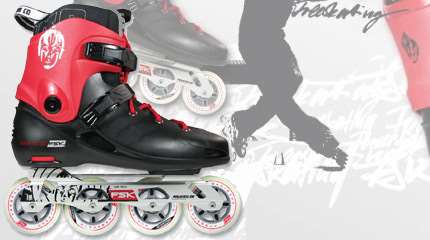
Zoom
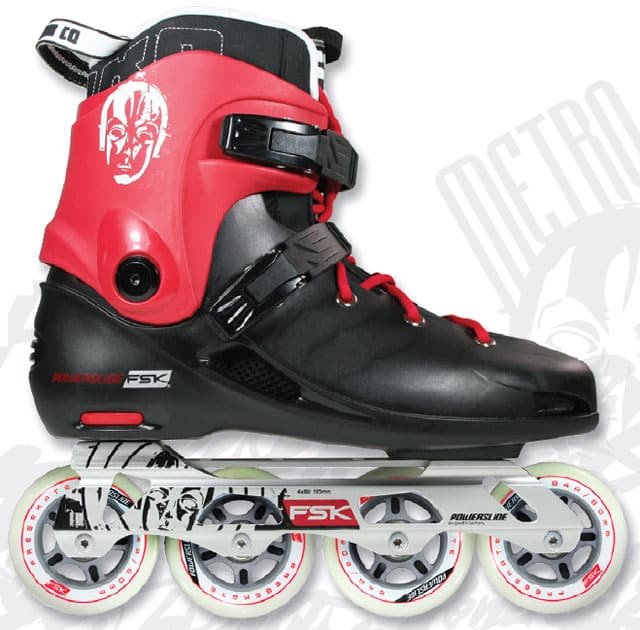 The freeride marketplace is paradoxically busy for a niche market, with the excellent Seba FR, the Rollerblade Twister, the K2 Fatty Paris (Frontman), the Roces ASP 100, and more.
The freeride marketplace is paradoxically busy for a niche market, with the excellent Seba FR, the Rollerblade Twister, the K2 Fatty Paris (Frontman), the Roces ASP 100, and more.
Powerslide decided to rattle the cages by offering an entry-level model, with a price tag of no more than 150 euros. 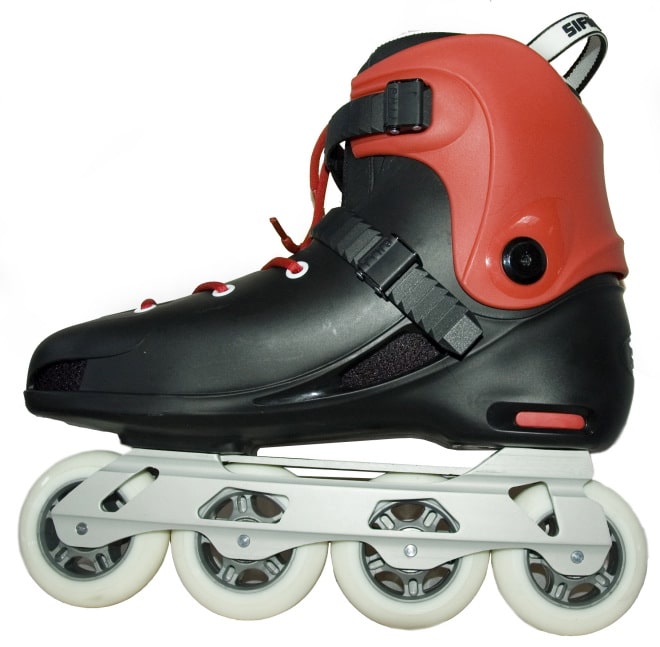
Design
At first sight, the Metro looks familiarly similar to other models of the segment: it looks like a Twister boot with a Seba cuff, but make no mistake, it’s a different story.
The elegantly simplistic black boot sports no extra adornments, only a small « Powerslide FSK » on the heel just above the shock absorber, no more. The red cuff, that gives the skate a very attractive look, only bears the « Metro » logo. As for the frame, its looks are reminiscent of the famous K2 Fatty Paris design, with, again, the Powerslide touch: a FSK stamp and a graphic echo of the skate logo.
Simple and straightforward, the Metro style matches well with the freeride spirit. 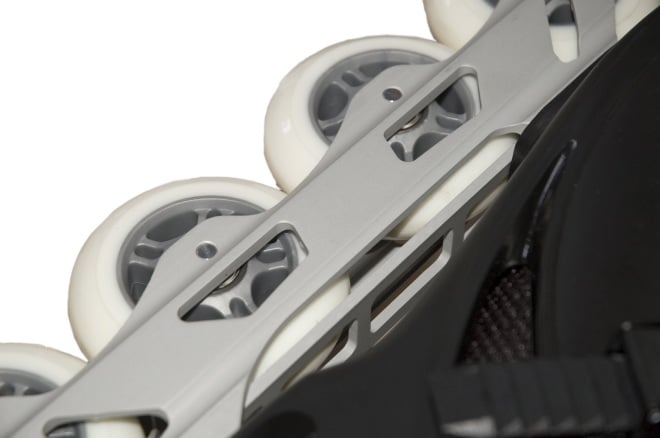
Solidity and rigidity
Don’t even mention sturdiness, the Metro skate is a panzer tank!
There is no doubt that this is one of the major positive points of this skate. Quite obviously, Powerslide targets this skate to the most agressive freeriders (« jackasses », if you will), not for sunday familymen.
Boot and cuff are made of rather thick pretty hard plastic material, with no detrimental impact on the weight, which give absolute reactivity to the skate. Beware that this very rigidity may be felt as a negative by some users because it does unfortunately transmit all the terrain imperfection directly to the foot, much more so than with other skates.
As a matter of fact, we ended up adding an amortizing inside sole for more comfort. 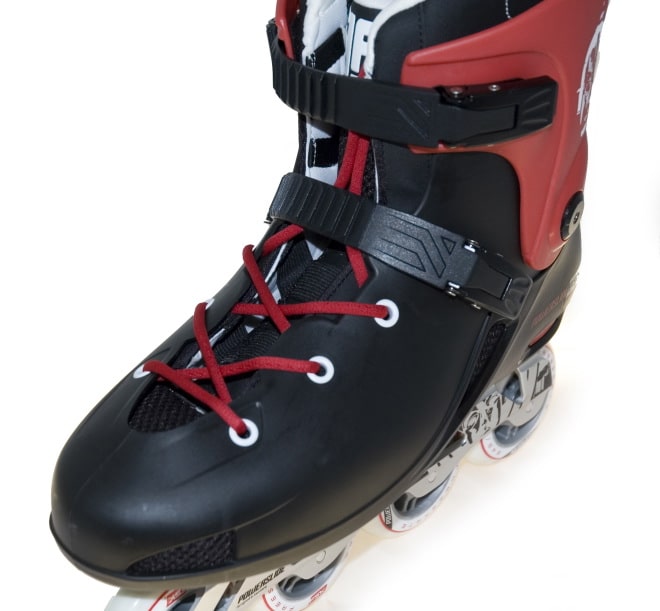
Comfort
Powerslide chose a Sifika liner which has a longstanding reputation.
It is a comforatble fit without any hard points… but it remains to be said that it will be some time before it adapts to your foot (or for your foot to adapt to it!) so that you really enjoy the ride.
Remember that the boot has maximum rigidity and the Sifika liner can’t fully compensate this mixed blessing.
Both the overall looks and the presence of a shock absorber strangely remind os of the Twister.
This absorber is really welcome, even though a larger unit might have been even better: as it is, it can’t fully smooth out the terrain asperities, pebbles and cobblestones that are common happenings in a freeride.
Fastening and support
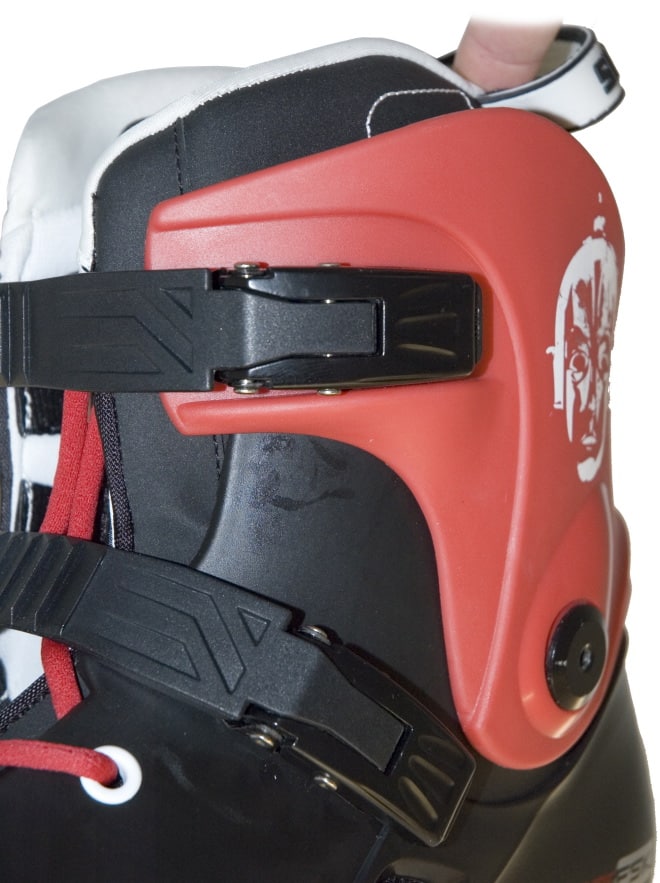 The Metro fastening relies on a very classical system : laces with two micrometric clasps on the instep and at the top of the cuff. Classical, but efficient.
The Metro fastening relies on a very classical system : laces with two micrometric clasps on the instep and at the top of the cuff. Classical, but efficient.
If so desired, you can lace up to the very top of the shoe via the internal fittings on the Sifika liner.
The micrometric straps keep the heel well in contact with the bottom of the shoe.
It’s a good thing that Powerslide has fitted the clasps with a blocking system that keeps them from springing open at every shock. You must press a button to release them open.
The whole fastening system and the cuff rigidity really restrain lateral flex, while permitting a good forward/backward flex. So we do have here a good general support of the foot and ankle.
Frame
The frame looks solid too, its design globally resembles that of other well-known freeride frames.
So it relies on proven concepts. Aluminium makes it rather light. With a 165mm center distance, it accepts 80mm diameter wheels at the most. Oblong slots enable perfect tuning of the frame position to the skater’s morphology.
What’s more, the boot positioning options would even accomodate a 195mm center-distance frame ! 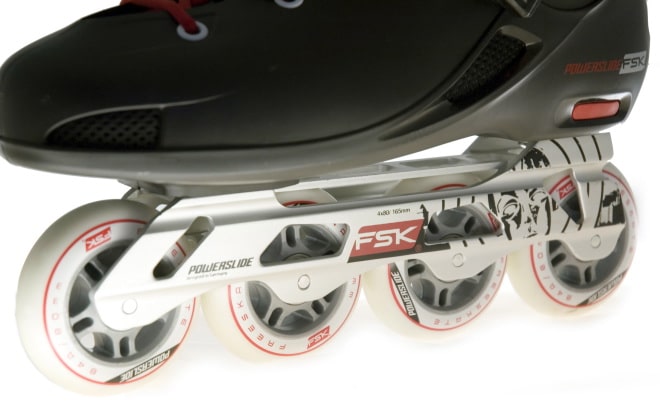
Bearings
Powerslide ABEC 7 offer adequate glide, but nothing to write home about. On our test skates, some of them lost their snap rings and the shields moved about. 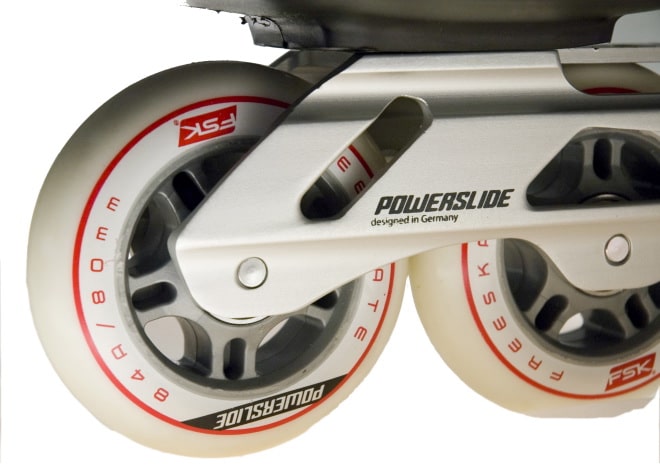
Wheels
Powerslide provides 80mm wheels at 84A shore. They offer really good grip… but the glide is ho-hum.
The core has a reminiscent look of the older Hyper models. The white gum, though, shows a very irregular wear.
After a few T-stops and deliberate moves in urban skating, the surface exhibited rapid degradation.
Hardware
Screws are Tor-X, which is rather unusual on a freeride skate, but common with Powerslide.
As a matter of fact, that’s what they offer on all their speedskates.
The advantage is a much cleaner grip for tightening than with an allen imprint. The big drawback of the Metro hardware is that it is temperamental.>br< Screws have delusions of freedom !
We had to replace some screws twice after losing them and tighten them every 5 minutes.
Do not overlook the need for thread locking glue to avoid this inconvenience.
Finishing
The skate construction is clean. There are no plastic or glue residues to be found.
We appreciated the aluminium plate under the boot which makes tuning the frame position easier and enhances the overall rigidity (ala Seba, one must say). We also liked the system preventing accidental opening of the clasps. There is also a washer between the frame and the screw head which reduces the frame wear around the fittings. This is quite a satisfactory finishing quality for the money.
Conclusion
Testing shows the METRO to be a good freeride skate : its rigidity, its solidity and its foot support are strong points. They confer outstanding reactivity to a level seldom achieved by other freeride skates.
But strong points can also be detrimental : terrain imperfections are are transmitted to the foot with little damping and the lack of comfort might discourage the less committed skaters.
Another lament is the lack of quality of the hardware: cuff screws, and to a lesser degree frame screws, require tightening attention way too often.
For a 149 euros price tag, Powerslide delivers a competitive skate, even though it could welcome improvements in terms of comfort, wheels and hardware. 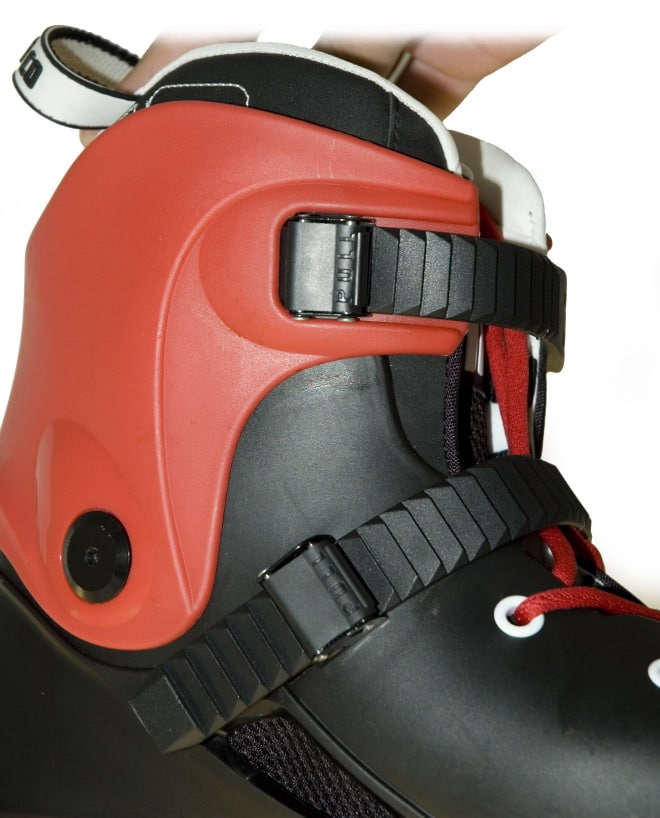
Technical characteristics
Boot : Rigid composite with X-slot mounting
Liner : Sifika foam, anatomic mesh
Fastening : Micrometric clasps, laces
Sizes : 38 to 46
Frame : Aluminium UFS – Metro FSK 4×80 mm (total 243 mm)
Max wheel diameter : 80 mm
Wheels : Powerslide Freestyle 80 mm 84A
Bearings : Powerslide ABEC 7
Spacers : Aluminium
Price : 149 Euros
Strengths and weaknesses
 |
Plus + Boot and frame rigidity |

Minus – Boot rigidity (no, that’s no mistake) |
Marks
| Flex/rigidity |  |
08/10 |
| Foot Support |  |
09/10 |
| Fastening |  |
07/10 |
| Comfort |  |
06/10 |
| Frame |  |
09/10 |
| Bearings |  |
08/10 |
| Wheels |  |
05/10 |
| Hardware |  |
05/10 |
| Finishing |  |
07/10 |
| Value for money |  |
07/10 |
|
OVERALL MARK: |
71% |
Links
Powerslide Web Site
The article in French here
Translation : HUB
Photos : Alfathor
